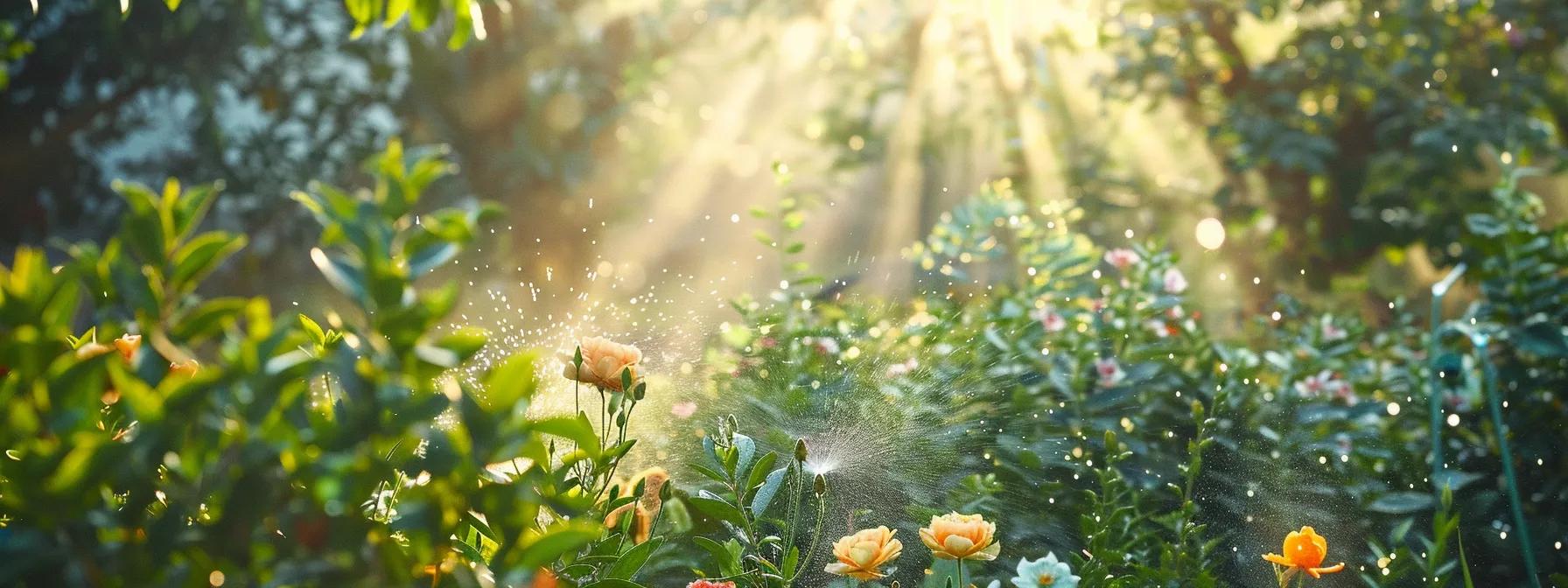Table Of Contents:
- Understanding Eco-Friendly Lawn Sprinklers and Their Importance
- Key Advantages of Implementing Eco-Friendly Lawn Sprinklers
- Key Advantages of Implementing Eco-Friendly Lawn Sprinklers
- Water Efficient Lawn Sprinkler Systems vs. Traditional Systems
- Selecting the Right Eco-Friendly Lawn Sprinkler for Your Garden
- Practical Tips for Maximizing Water Conservation
- Real-Life Case Studies of Eco-Friendly Lawn Sprinklers
- Conclusion
Are you tired of high water bills and a dry, uninviting yard? Many homeowners feel frustrated by traditional irrigation methods that waste water and harm their landscape. This article will explore eco-friendly lawn sprinklers, highlighting their impact on water supply efficiency and the benefits they offer, such as easy integration with modern web browser applications for smart management. By understanding how these systems work and their advantages, readers will find solutions to enhance their gardens while conserving water. Engage with this content to transform your approach to lawn care and create a lush, sustainable outdoor space.
Understanding Eco-Friendly Lawn Sprinklers and Their Importance

Eco-friendly lawn sprinklers are designed using materials like stainless steel and advanced pressure mechanisms that promote efficient watering. These systems play a crucial role in water conservation, minimizing drainage issues while supporting the health of soil and plants. The following sections will explore the mechanisms behind eco-friendly sprinklers and their impact on modern gardening practices.
Defining Eco-Friendly Lawn Sprinklers and Their Mechanisms
Eco-friendly lawn sprinklers, particularly impact sprinklers, utilize advanced technology to ensure precise watering while minimizing waste. These systems are engineered to distribute water evenly over the soil, reducing runoff and ensuring that every drop reaches the roots of plants, seeds, and leaves. By optimizing water usage, eco-friendly sprinklers promote healthier plant growth while conserving precious resources.
In addition to their water efficiency, these sprinklers often work in conjunction with organic fertilizers and pest management practices. By maintaining optimal moisture levels, eco-friendly sprinklers help create an environment where beneficial microorganisms thrive, aiding in the breakdown of fertilizers and enhancing soil health. This contributes to a balanced ecosystem that protects plants from pests naturally, reducing the need for chemical treatments.
Moreover, eco-friendly sprinklers are designed to adapt to various garden conditions, incorporating features that address specific plant needs. For instance, some models allow for adjustable spray patterns to accommodate different leaf types and growth stages, ensuring that delicate seedlings receive gentle hydration while established plants benefit from a more robust application. This flexibility not only supports diverse garden ecosystems but also empowers homeowners to implement sustainable gardening practices effectively.
The Role of Water Conservation in Modern Gardening Practices
Water conservation is essential in modern gardening practices, particularly in regions such as Kentucky where the climate can fluctuate significantly. By integrating eco-friendly lawn sprinklers, gardeners can minimize water usage, ensuring that every drop is used efficiently to maintain healthy plants. These systems contribute to sustainable gardening by reducing waste and directing water effectively, especially to drought-resistant varieties like Festuca grass.
Utilizing a rain gauge can further enhance water conservation efforts by enabling homeowners to monitor rainfall and adjust their irrigation accordingly. This practice ensures that gardens receive adequate moisture without overwatering, which can lead to runoff and drainage problems. With accurate data on precipitation levels, gardeners can make informed decisions on when and how much to water, reinforcing efficient resource use.
The diameter of the sprinkler heads plays a crucial role in water distribution efficiency. Eco-friendly sprinklers designed with adjustable diameters allow for targeted watering that can meet the specific needs of different plant species and their growth stages. This tailored approach not only conserves water but also fosters a thriving garden by providing the right amount of moisture where it is most needed, reinforcing the importance of water conservation in responsible gardening practices.
Now that the significance of eco-friendly lawn sprinklers is clear, it is time to explore the key advantages they offer. These benefits reveal why making the switch matters for both the lawn and the environment.
Key Advantages of Implementing Eco-Friendly Lawn Sprinklers
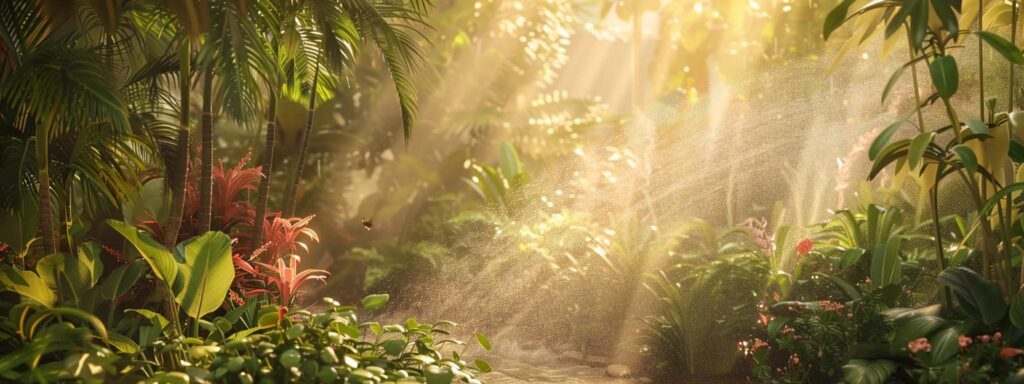
Key Advantages of Implementing Eco-Friendly Lawn Sprinklers
Eco-friendly lawn sprinklers offer significant advantages, starting with their efficient design that reduces water waste. Incorporating features like spray nozzles and rain sensors, these systems prevent flooding and ensure optimal irrigation. They also contribute positively to plant health and soil quality while providing cost savings over time through lower water bills, making them a smart choice for sustainable gardening.
Reducing Water Waste Through Efficient Design
Eco-friendly lawn sprinklers utilize advanced spray technology that significantly reduces water waste through efficient design. These systems deliver precise amounts of water directly where it is needed, ensuring that sod receives optimal hydration without excessive runoff. By minimizing evaporation and addressing specific plant needs, these sprinklers help maintain a healthy garden while conserving water resources.
The design of eco-friendly sprinklers often incorporates features that enhance pest control, creating an environment less conducive to plant disease or infestations. By efficiently watering plants and preventing overly damp conditions that attract pests, these systems contribute to healthier landscapes. This proactive approach enables homeowners to maintain vibrant gardens while reducing the need for harmful pesticides.
Additionally, utilizing durable materials instead of plastic in sprinkler construction enhances longevity and reduces environmental impact. These eco-friendly options are designed to adapt to various terrains, including driveways and flower beds, ensuring efficient watering across the entire property. Homeowners can depend on these versatile systems to sustain their gardens and landscaping efficiently while limiting waste and promoting sustainability.
Advantages for Plant Health and Soil Quality
Eco-friendly lawn sprinklers significantly enhance plant health by delivering water precisely where it is needed. Systems that utilize valves and pumps engineered for maximum efficiency ensure that plants receive appropriate moisture, effectively combating the challenges posed by varying climate conditions. This targeted watering approach is especially beneficial during periods of drought, providing essential hydration while minimizing waste.
The advanced design of eco-friendly sprinklers reduces wear and tear on both the equipment and the garden. By carefully controlling the flow and coverage of water, these systems help prevent over-saturation, which can lead to soil compaction and other issues that harm plant roots. Healthier soil promotes stronger plants and a more vibrant garden, creating a thriving ecosystem that is resilient to pest infestations and diseases.
Moreover, maintaining optimal soil moisture improves nutrient absorption, which is crucial for plant growth. Eco-friendly sprinklers support the development of beneficial microorganisms in the soil, enhancing soil quality over time. With consistent and careful watering, homeowners can foster a landscape that not only thrives but also requires less intervention, making eco-friendly systems a wise investment for any garden.
Cost Savings Over Time With Lower Water Bills
Implementing eco-friendly lawn sprinklers can lead to significant cost savings over time by reducing water bills for homeowners. These advanced systems use precise technology to deliver the appropriate amount of water directly to the roots of perennial plants, minimizing waste. As a result, homeowners can maintain lush gardens without the concern of high costs associated with traditional watering methods, such as using a garden hose or large pipes that often lead to runoff.
Moreover, eco-friendly sprinklers made from durable materials like brass ensure longevity, which translates to fewer replacements and repairs. Unlike plastic components that may degrade, brass fixtures withstand various weather conditions, offering reliable performance for years. This durability further enhances the cost-effectiveness of using these sprinklers, as the investment pays off through reduced maintenance needs and lower overall expenses associated with garden care.
Additionally, eco-friendly sprinklers help prevent soil erosion by delivering water more effectively, which is critical for maintaining garden health. By controlling water flow and preventing excessive saturation, these systems support root development and contribute to building strong soil structure. This proactive approach not only nurtures the garden but also reduces costs linked to soil degradation and the need for additional soil amendments or corrective measures.
Eco-friendly lawn sprinklers offer a cleaner way to care for your garden, saving both water and money. Next, let’s compare water-efficient systems to traditional setups and see how they stack up in the battle for efficiency.
Water Efficient Lawn Sprinkler Systems vs. Traditional Systems
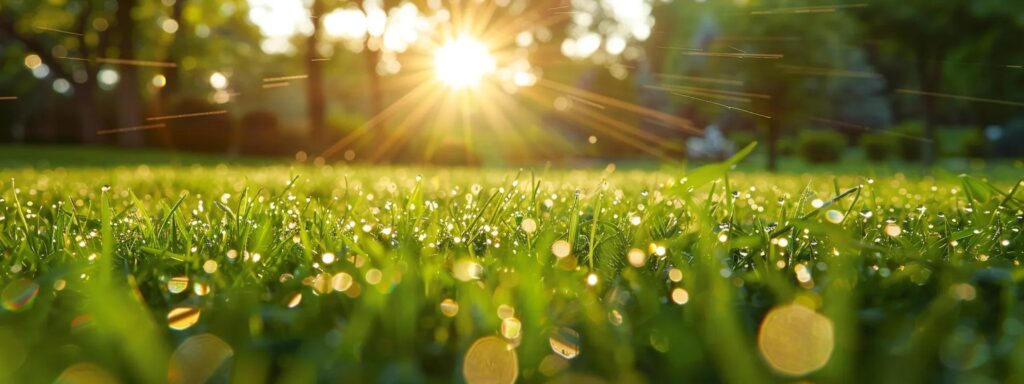
The comparison of water-efficient lawn sprinkler systems and traditional systems reveals significant differences in water usage and efficiency rates. While traditional systems often rely on methods like hose watering, eco-friendly options such as drip irrigation offer targeted hydration, significantly reducing waste. Additionally, the setup and maintenance of water-efficient systems are usually simpler and more sustainable, providing benefits that extend to the overall environmental impact. Understanding these aspects helps homeowners make informed choices that support healthier lawns, including popular varieties such as Poa pratensis, while minimizing soil impact often caused by improper watering methods.
Comparing Water Usage and Efficiency Rates
In comparing water usage between water-efficient lawn sprinkler systems and traditional options, eco-friendly models, such as those using turbine technology, provide far superior efficiency. For instance, Rain Bird systems are known for their ability to optimize water distribution, ensuring that irrigation precisely targets the radius required for healthy plant growth. This careful targeting minimizes excess precipitation that can lead to runoff, keeping gardens well-hydrated while conserving valuable resources.
Traditional systems often rely on less precise methods of watering, such as simple hose use, which can result in uneven moisture distribution. These approaches frequently cause overwatering in some areas while leaving others dry, creating challenges for maintaining healthy gardens. With innovative sprinkler designs that include adjustable spray patterns, eco-friendly options can deliver a controlled shower of water exactly where needed, thus enhancing overall garden health.
The efficiency rates of eco-friendly systems further enhance their value. By leveraging advanced technologies, these sprinklers dramatically reduce water waste, translating into lower water bills for homeowners. As sustainable practices gain importance, choosing a modern lawn sprinkler system that efficiently manages water use not only supports individual gardening success but also contributes to broader conservation efforts within the community.
Differences in Setup and Maintenance
Setting up eco-friendly lawn sprinkler systems often requires less initial labor compared to traditional options. Many modern systems designed for efficiency, such as those incorporating metal components, can be easily configured to suit various lawn sizes and shapes. For instance, options that rotate based on the specific landscape design can adapt to intricate layouts without extensive modifications.
Maintenance practices for water-efficient systems generally involve fewer complications as well. Constructed with durable materials, these sprinklers not only resist wear but also require less frequent replacement. This reliability saves homeowners time and effort, especially when compared to traditional hoses that may need regular inspection or repair due to wear and tear from tractor use or extreme weather conditions.
Furthermore, the technologically advanced nature of eco-friendly systems allows for straightforward adjustments and repairs. Many models feature simple rotation mechanisms that homeowners can manage easily, enabling precise watering without needing professional assistance. This ease of use encourages proper care and maintenance, ensuring that the sprinkler operates optimally to keep lawns lush and healthy.
Environmental Impact of Water-Efficient Systems
The environmental impact of water-efficient lawn sprinkler systems is profound, primarily due to their design which minimizes water waste. For instance, employing a check valve in these systems prevents unwanted leaks, ensuring that water reaches targeted areas without unnecessary loss. This targeted approach not only conserves water but also reduces runoff, which can carry pollutants into local waterways, contributing to environmental degradation.
Moreover, the precision of eco-friendly systems allows for tailored watering schedules that meet the specific needs of various species in a garden. By utilizing nozzles that distribute water evenly, these systems lower the chances of creating overly damp conditions that may lead to disease in plants. This proactive management enhances the overall health of the garden, fostering a thriving ecosystem that relies less on chemical interventions.
The choice of a lawn sprinkler can shape the health of your garden and the environment. Understanding how to select the right eco-friendly system opens the door to a more sustainable and vibrant outdoor space.
Selecting the Right Eco-Friendly Lawn Sprinkler for Your Garden
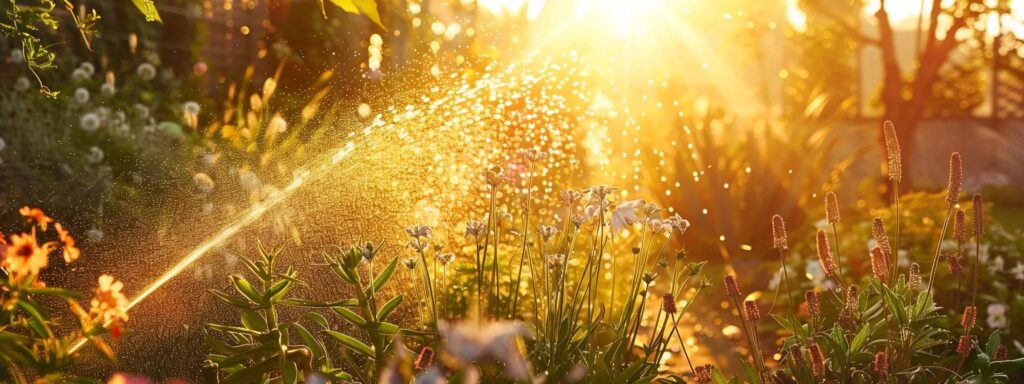
When selecting the right eco-friendly lawn sprinkler for a garden, homeowners should consider several key factors. These include assessing the gear and sensors for optimal water efficiency, ensuring the system minimizes evaporation and debris accumulation, and exploring popular brands and models that excel in performance. Each aspect contributes to a well-functioning irrigation system and a healthier garden environment.
Factors to Consider When Choosing a Sprinkler System
When choosing an eco-friendly lawn sprinkler system, it’s essential to consider the specific size and layout of the garden. Larger areas may benefit from systems that offer extensive coverage, ensuring that every plant receives adequate hydration. Understanding the unique needs of the plants and soil type will enable homeowners to select a system that delivers the appropriate amount of water, promoting optimal growth while conserving resources.
Another important factor is the type of sprinkler technology used. Sprinklers equipped with adjustable spray patterns allow for customized watering based on the garden’s varying conditions. These systems can effectively target specific plant groups, ensuring that delicate seedlings and mature plants receive the right amount of moisture, reducing waste and supporting a healthier ecosystem.
Lastly, homeowners should evaluate the durability and maintenance requirements of different sprinkler models. Systems made from high-quality materials, like brass or stainless steel, tend to provide a longer lifespan with minimal upkeep. Selecting a reliable sprinkler system not only ensures efficient water usage but also saves time and effort in maintaining a beautiful landscape.
Recommended Features for Optimal Water Efficiency
When selecting an eco-friendly lawn sprinkler, homeowners should prioritize models equipped with adjustable spray patterns. This feature allows for targeted watering, ensuring that different plant types receive the specific moisture they require. By customizing the spray settings, gardeners can significantly reduce water waste and promote healthier growth across diverse garden ecosystems.
Another essential feature to consider is the incorporation of rain sensors. These sensors automatically detect rainfall, adjusting the watering schedule accordingly to prevent overwatering. This not only conserves water but also protects plants from the detrimental effects of excessive moisture, thus fostering a balanced garden environment.
Durable construction materials, such as stainless steel or brass, are also vital when choosing an eco-friendly lawn sprinkler. These materials enhance longevity and resist wear from varying weather conditions. By investing in a sturdy sprinkler system, homeowners can ensure efficient long-term use while effectively managing water resources in their gardens.
Popular Brands and Models in the Market
When selecting eco-friendly lawn sprinklers, homeowners often consider leading brands such as Rain Bird and Hunter. These companies are known for their commitment to sustainability and efficiency, offering models that effectively minimize water waste while providing adequate coverage. For example, Rain Bird‘s line of drip irrigation systems allows users to target watering precisely, making them ideal for gardens with diverse plant species that require varying moisture levels.
Another notable option is the Orbit Sprinkler System, which features smart technology to optimize water usage. Orbit’s models often come with built-in rain sensors and adjustable spray patterns, catering to the specific needs of individual gardens. This adaptability not only enhances plant health but also contributes to significant water conservation efforts, addressing common concerns for environmentally conscious homeowners.
Lastly, Toro is another brand recognized for its innovative sprinkler solutions. The Toro Eco-Strip System, for instance, uses advanced technologies to regulate water output efficiently. With a focus on reducing runoff and evaporation, Toro’s products not only help maintain a vibrant garden but also support homeowners in their quest for sustainable landscaping practices, making them a popular choice among eco-friendly gardening enthusiasts.
With the right eco-friendly lawn sprinkler in place, the next step beckons. Learn practical ways to conserve water and nurture your garden, ensuring every drop counts.
Practical Tips for Maximizing Water Conservation
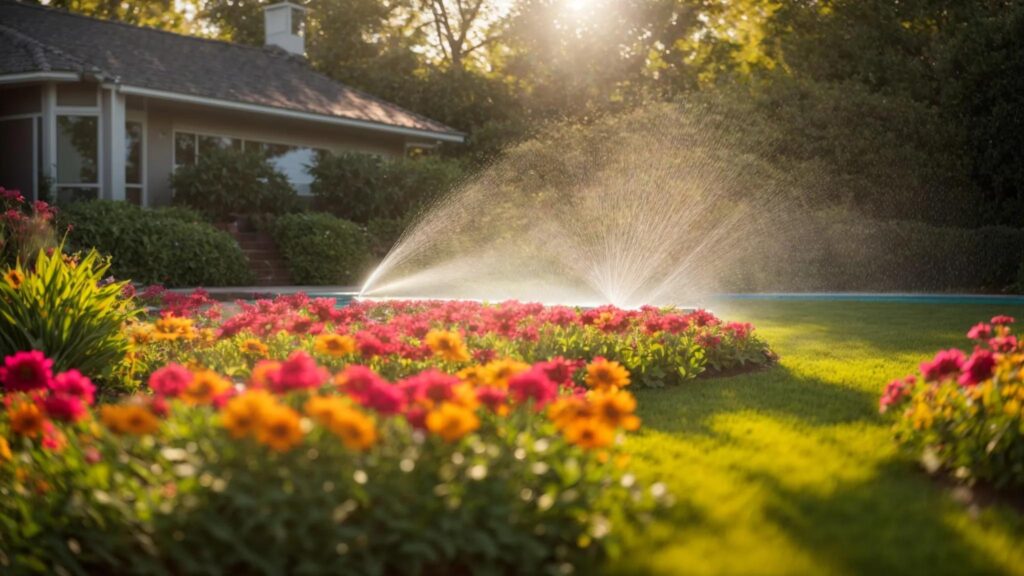
Maximizing water conservation in gardens equipped with eco-friendly lawn sprinklers involves effective scheduling and usage techniques. By integrating rain sensors and moisture detectors, homeowners can ensure efficient irrigation tailored to their plants’ needs. Additionally, making seasonal adjustments enhances the performance of these systems, allowing for precise water delivery throughout the year.
Techniques for Effective Scheduling and Usage
Effective scheduling is key to maximizing water conservation when using eco-friendly lawn sprinklers. Homeowners should consider watering during the early morning or late afternoon to minimize evaporation, ensuring that moisture reaches the roots where it is most needed. This practice not only conserves water but also promotes healthier plant growth, as cooler temperatures allow for better absorption.
Incorporating rain sensors into the sprinkler system can significantly enhance water efficiency. These sensors automatically adjust watering schedules based on recent rainfall, preventing over-saturation and unnecessary water waste. By utilizing such technology, homeowners can protect their investments in landscaping while further supporting sustainable gardening practices.
Regularly monitoring garden conditions is another essential technique for effective sprinkler usage. Homeowners can assess soil moisture levels before watering, using tools like moisture meters. This ensures that the garden receives only the water it requires, fostering robust plant health while reinforcing a commitment to water conservation across the gardening community.
Integrating Rain Sensors and Moisture Detectors
Integrating rain sensors into eco-friendly lawn sprinkler systems allows homeowners to optimize water usage effectively. These sensors automatically detect rainfall and adjust irrigation schedules accordingly, ensuring that gardens receive water only when necessary. By preventing overwatering, rain sensors contribute significantly to conserving water resources and promoting a healthier garden environment.
Moisture detectors enhance irrigation efficiency by providing real-time data on soil hydration levels. When soil moisture drops below a predetermined threshold, the system activates to deliver water exactly when needed, preventing both over- and under-watering. This targeted approach ensures that plants receive the right amount of moisture, fostering robust growth while minimizing waste.
Seasonal Adjustments for Optimal Performance
Seasonal adjustments are crucial for optimizing the performance of eco-friendly lawn sprinklers. During warmer months, it may be necessary to increase watering frequency to counteract higher evaporation rates, ensuring plants remain adequately hydrated. By observing the changing weather patterns and adjusting the sprinkler settings accordingly, homeowners can maintain healthy gardens while conserving water.
In the cooler months, gardeners should consider reducing the frequency of watering as the moisture retention in the soil may improve. Eco-friendly sprinklers allow for simple adjustments, enabling homeowners to tailor their irrigation according to seasonal needs. This flexibility supports sustainable practices by directing water only when necessary, thereby minimizing waste and enhancing the efficiency of the irrigation system.
Additionally, as seasons change, different plants may require customized care. Adjusting spray patterns or duration based on plant needs not only promotes optimal growth but also conserves water effectively. By paying attention to the specific requirements of various plants throughout the year, homeowners can ensure their eco-friendly lawn sprinklers contribute positively to the overall health of their gardens.
Water conservation efforts yield impressive results. In the next section, real-life examples will show how eco-friendly lawn sprinklers can make a difference.
Real-Life Case Studies of Eco-Friendly Lawn Sprinklers
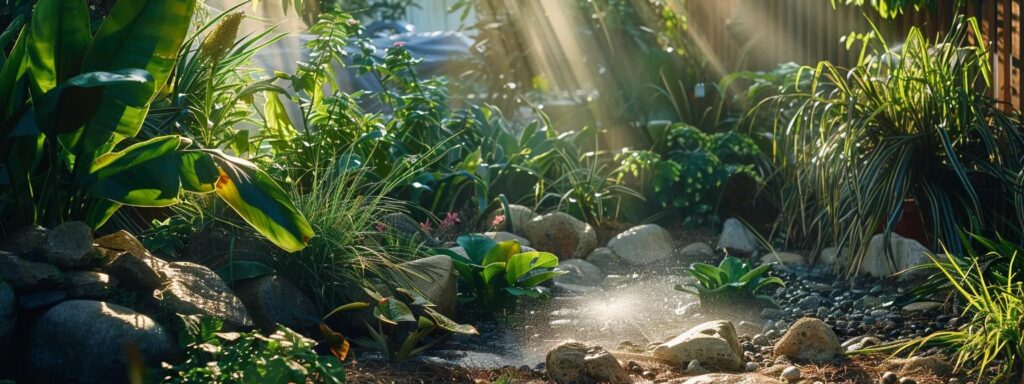
Homeowners and gardeners who have implemented eco-friendly lawn sprinklers report impressive success stories that highlight their measurable impact on water conservation. Testimonials reveal the benefits experienced, including reduced water bills and healthier plants. This section will explore these success stories, showcasing practical insights that emphasize the value of adopting eco-friendly irrigation systems for sustainable gardening.
Success Stories From Homeowners and Gardeners
Homeowners who have switched to eco-friendly lawn sprinklers report significant reductions in their water usage, often leading to lower monthly bills. For instance, one garden center owner in Michigan observed a 30% decrease in water consumption after implementing a drip irrigation system. This change allowed for not only cost savings but also healthier plants, as the targeted watering promoted better root development.
Additionally, gardeners utilizing advanced eco-friendly sprinkler technology have noticed improvements in overall plant health and aesthetics. A residential property owner shared that their vibrant flower beds thrived after installing an adjustable sprinkler system, which distributed water evenly according to varying plant needs. The enhanced moisture levels supported robust growth, illustrating the value of investing in sustainable irrigation methods.
Community gardens transitioning to eco-friendly lawn sprinklers have witnessed remarkable success, showcasing their ability to foster biodiversity. One local garden initiative reported an uptick in diverse plant species thriving within their landscape after adopting a sprinkler system designed for efficiency. By promoting an environment where plants receive optimal hydration, these systems encourage healthier ecosystems while conserving essential water resources.
Measurable Impact on Water Conservation
Eco-friendly lawn sprinklers have demonstrated significant water conservation benefits in various real-life applications. Homeowners who switched to these modern systems often report measurable reductions in water usage, with some seeing savings of up to 30% in their monthly water bills. This reduction not only helps to maintain a budget but also reinforces sustainable gardening practices that benefit the environment.
For instance, a community garden in Michigan adopted eco-friendly sprinklers and noted a marked improvement in water management. By implementing targeted watering techniques, the garden minimized waste and improved soil hydration. This proactive approach allowed diverse plant species to thrive, demonstrating how intelligent irrigation choices can lead to healthier ecosystems and less water runoff.
The success stories of homeowners adopting eco-friendly lawn sprinklers underscore their effectiveness in promoting water conservation. Many users enjoy the added benefit of healthier plants as these systems deliver moisture directly to the roots, enhancing growth without unnecessary resource drain. As a result, eco-friendly sprinklers not only make gardens more sustainable but also enable homeowners to contribute positively to their local environment.
Testimonials on the Benefits Experienced
Homeowners have frequently reported transformative results after transitioning to eco-friendly lawn sprinklers. One homeowner shared that after installing a drip irrigation system, their water bills dropped by 25%, providing noticeable savings while maintaining a lush garden. This efficient watering solution allowed for optimal hydration without the fear of waste, demonstrating the financial benefits of sustainable irrigation systems.
Another gardener highlighted the health improvements in their flower beds following the switch to eco-friendly sprinklers. With adjustable spray patterns, the system effectively catered to the specific needs of various plants, resulting in vibrant blooms and strong foliage. This shift not only enhanced the aesthetics of their landscape but also fostered a more robust and resilient garden ecosystem.
Community gardens have also experienced the benefits of these innovative sprinklers, showcasing their impact on biodiversity. A local initiative reported a significant increase in plant diversity after adopting eco-friendly sprinkler systems, which provided targeted watering to various species. By aligning irrigation practices with environmental sustainability, these gardens demonstrated how eco-friendly solutions can yield healthier and more varied plant life while conserving essential water resources.
Conclusion
Choosing eco-friendly lawn sprinklers for your garden is essential for promoting water conservation and enhancing plant health. These advanced systems deliver precise hydration, significantly reducing waste while fostering a robust ecosystem. By integrating features like adjustable spray patterns and rain sensors, homeowners can ensure their gardens receive optimal moisture without unnecessary expenditure. Adopting eco-friendly irrigation solutions not only benefits individual gardens but also contributes to broader environmental sustainability efforts.

